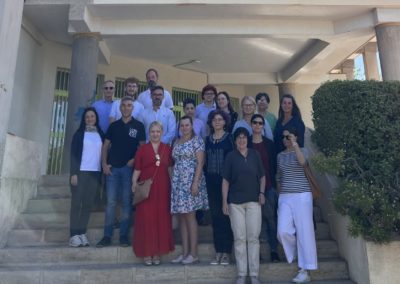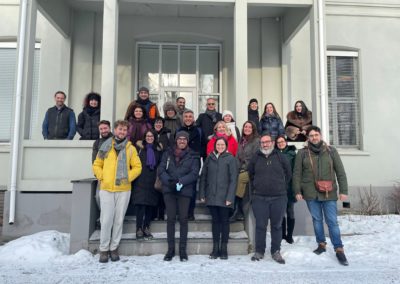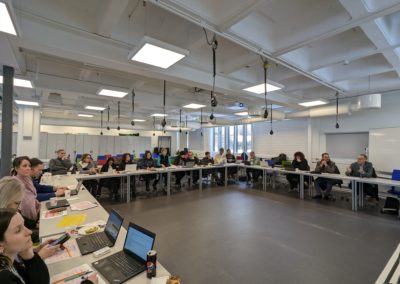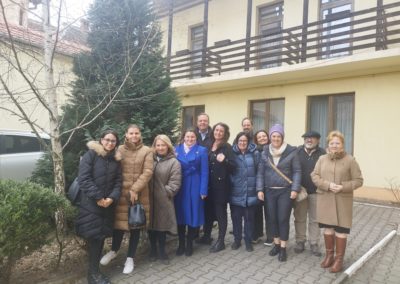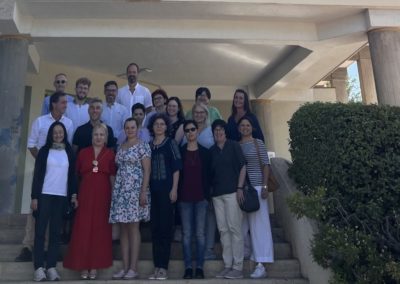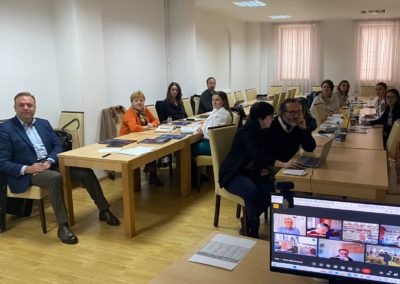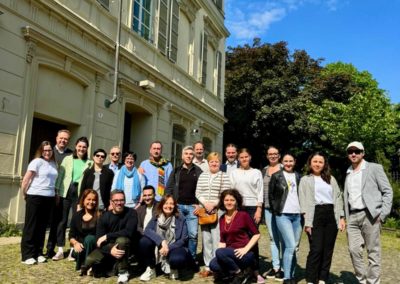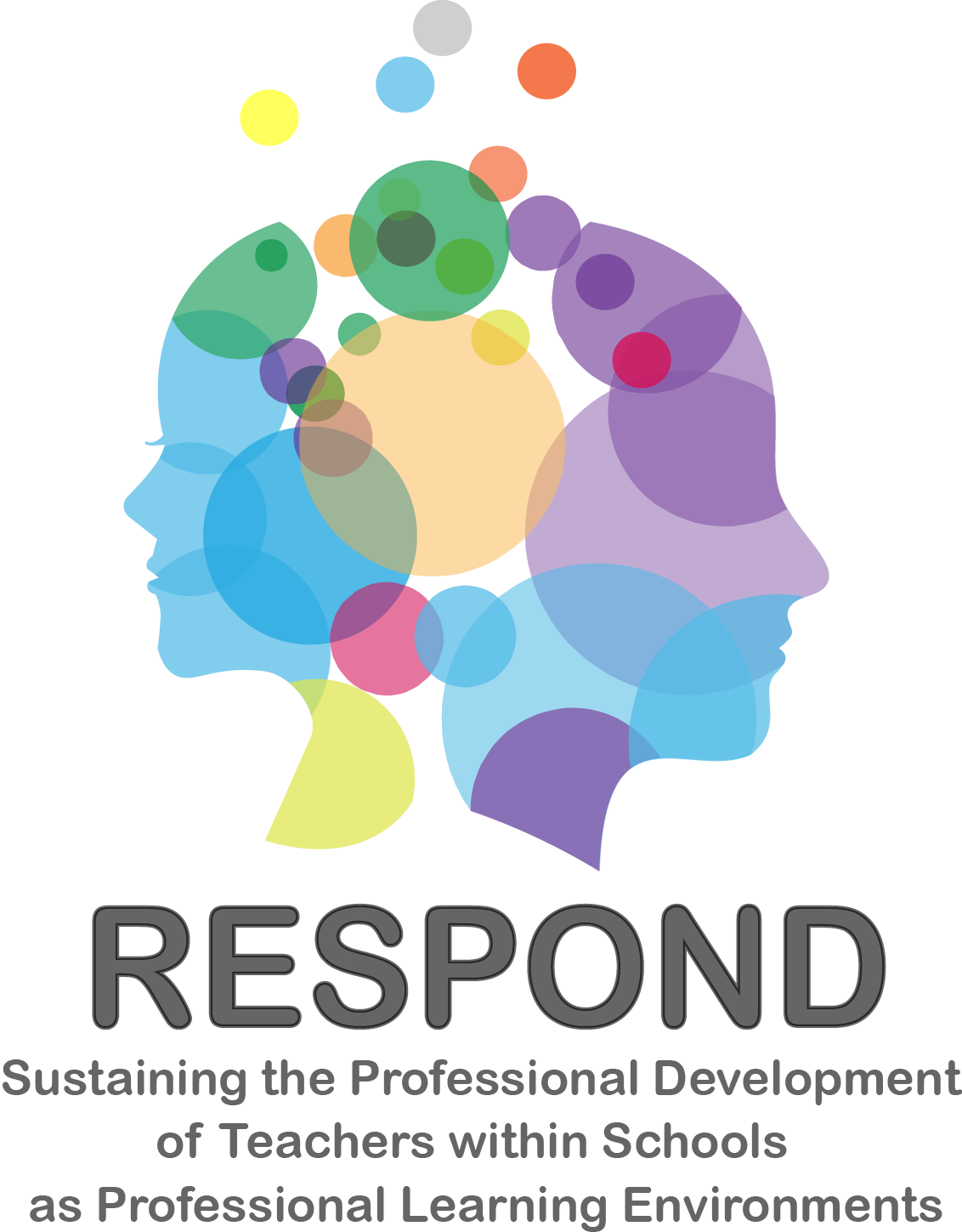01-12-2021 – 30-11-2024
RESPOND Project
Sustaining the Professional Development of Teachers Within Schools as Professional Learning Environments

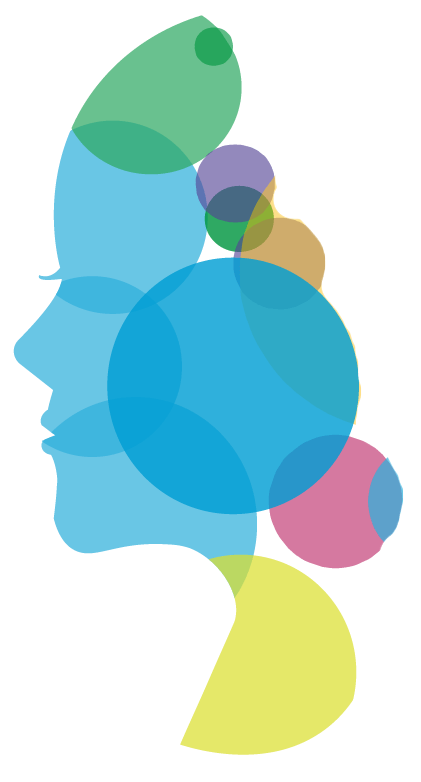
Respond Overview
Project Aims
RESPOND: Investigate and Analyse
Investment in provision for teacher professional development is a significant part of educational policy and budget expenditure in European countries. There is a growing body of research concerned with evaluating the efficacy of that provision and identifying obstacles to its successful implementation in terms of ongoing professional learning and the achievement of high-level competence. The point of departure for RESPOND is the belief that there is a need to investigate and analyse the complex relationship between teacher professional development and overall school development and identify ways in which they can be mutually sustaining.
Data collection and analysis involves force-field analysis, to identify factors that facilitate and impede teacher professional and school development, and ecological analysis, to analyse the influence of five interconnected environmental systems: microsystems, mesosystems, exosystems, macrosystems and chronosystems. The aim is to build a framework for researching and identifying contexts and conditions that facilitate the interdependence between professional development and school development and the sustainability of both.
RESPOND: Impact and Durability
The framework furnishes the basis for the production of project results related to the development of global competence for both teachers and the learning environments in which they work, together with the establishment of support guidelines and indexes containing indicators related to optimal characteristics of professional learning experiences and ways of maximizing their impact and durability in terms of teacher careers and organizational effectiveness.
The target groups and relevant stakeholders involved at all levels of the activities implemented cover a wide range of professional profiles. These include teachers at ISCED levels1 and 2, staff in faculties of education involved in initial and continuous teacher
education programs, as well as those involved in the provision of continuing professional development, advisory groups or individuals with this role in regional or national contexts, teacher professional associations, the inspectorate, senior management in schools and staff from all curricular areas.
RESPOND: Individual, Team and Institutional Development
Research carried out as the project progresses allows both the teacher education institutions and the schools themselves to gain further knowledge of, as well as methodological competence related to, the complex processes involved in ongoing teacher professional development and its reciprocal relationship with school development. The researchers and their partner organizations thus benefit in terms of their ability to promote professional and school development on a wider scale within each of the partner countries, through dissemination activities beyond the partnership, and in terms of further national and transnational projects related to the same theme.
The target groups which comprise the networks formed in each of the partner countries involve researchers, teachers and schools at ISCED levels 1 and 2. The benefits for the teachers and the schools involved are related to furthering the sustainability of individual, team and institutional development, both in terms of the ability to identify needs related to impeding and facilitating factors and to elaborate and deliver action plans in order to reach ascertainable levels of impact and durability at each of these three intersecting levels of development.
Project Results
The RESPOND Teacher Professional Profile and Portfolio for Global Competence
PR1_The RESPOND Teacher Professional Profile and Portfolio for Global Competence
Part A contains the RESPOND Teacher Professional Profile Framework with four dimensions related to teaching for engagement in global and local issues and perspectives, intercultural communication and interaction, individual and collective wellbeing and acting for sustainability. The four dimensions feed into and out of each other, starting from a posing a guiding question and defining values and attitudes related to the focus.
Part B contains the RESPOND Teacher Professional Profile Portfolio is a tool designed to enhance the promotion of self-assessment processes related to evaluating the development of teachers’ professional competences linked to each of the dimensions of the framework.
The RESPOND framework for mentor and peer-to-peer support guidelines
PR2_The RESPOND framework for mentor and peer-to-peer support guidelines
Part A contains the RESPOND Mentor and Peer-to-Peer Support Framework, which focuses on the roles of and interactions between different actors in school, with reference to mentors, newly qualified teachers, experienced teachers, and school leaders, and defines Mentor Support Guidelines for formal institutional support and Peer-to-Peer Support Guidelines for informal support between colleagues. Part B contains supplementary documents to accompany the guidelines with an example of an agreement for mentors and leaders involved in peer-to-peer programs, an example of a peer-to-peer support agreement, a development plan for teachers, and tools that may support teachers in their professional development.
The RESPOND framework for school development as a professional learning environment
PR3_The RESPOND framework for school development as a professional learning environment
Part A contains the RESPOND School Development as a Professional Learning Environment Framework with four dimensions intended to permit a focus on four key areas related to educational values and leadership, a positive learn-ing environment, teacher professional development needs, and learning outcomes and impacts. Part B contains reflection sequences that aim to give indications for possible key questions related to a systematic approach to specific aspects of each of the four dimensions. The questions posed are intended to permit an assessment of the current situation in a school and consider action steps that can be taken in the light of what emerges.
The RESPOND promoting and monitoring sustainability indexes
PR4._The RESPOND promoting and monitoring sustainability indexes
The RESPOND Promoting and Monitoring Sustainability Indexes proposes an overall sustainability development framework with particular emphasis on identifying factors that facilitate and impede the sustainability of professional and school development and how facilitating factors can be increased and impeding factors reduced. Part A provides checklists regarding the levels of achievement in reaching high standards for each dimension. Part B is designed to help identify and reflect on particular strengths and weaknesses within the dimensions and action areas, the factors that can facilitate and impede achievement, how facilitating factors can be increased and impeding factors reduced, and what five specific actions can be undertaken to prioritize and improve weaknesses.
RESPOND. Sustaining the professional development of teachers within schools as professional learning environments
EBOOK RESPOND_11311.5+CAPPERUCCI-DODMAN_OA
The RESPOND project ebook brings together the four Project Results, supplemented by implementation experiences in Italian and Romanian schools. It explores the relationship between teachers’ professional development and the improvement of schools as professional learning environments, offering practical tools to support teacher growth and promote change in educational institutions. The Teacher Professional Profileand the Global Competence Portfolio help monitor skill development, while the Professional Development Guidelines, the School as a Learning Environment Framework, and the Sustainability Indexes provide operational tools to create concrete action plans. Designed for educators and teacher trainers, the ebook offers valuable resources for those involved in both initial and continuous teacher education.
The project enhances the professional development of teachers as members of a school community whose collective purpose is to promote learning, both for students and teachers themselves


How
Project Implementation
PROJECT PHASES
Transnational development of initial framework for data collection on facilitating and impeding factors in teacher professional development and school development within the project focuses and development of work packages with relevant activities and results for each of them.
Individual country initial data collection based on previous professional learning experiences of the participants in order to identify factors that facilitate and impede development in particular situations that involve given spheres of action and developing competences within the focuses.
Transnational development of support guidelines and sustainability indexes based on identifying and implementing ways of increasing facilitating factors and decreasing impeding factors in each focus.
Individual country main study data collection based on current ongoing professional learning experiences together with testing of support guidelines and implementation of sustainability indexes.
Transnational data analysis and production of report in order to define optimal characteristics of professional learning experiences and identify ways of maximizing their impact so as to render teacher professional development sustainable within the context of corresponding learning environment development.
PROJECT NETWORKING
The project focuses are developed according to specific networking implementation activities carried out by the partners involved in the project within their particular countries. These activities involve successive cycles of workshops, ongoing data collection procedures, production and experimentation of models and tools, analysis, and discussion meetings. Each country provides a specific contribution related to the skills and expertise of each partner organization.
The networks of schools in each partner country actively participate in each phase of the project in terms of being consulted in order to identify their needs and obtain their point of view while planning, informed of all decisions taken and the ongoing data collection and monitoring processes that take place, and involved as protagonists in all the activities conducted.
There is a multilateral flow of exchanges from and to each partner country and its network of schools so that all the participating schools, teachers, classes, and learners can be a part of and gain benefit from the project. Each of the activities foresee opportunities for all participants to provide feedback and feedforward at each one of these participation levels.
TRANSNATIONAL PROJECT MEETINGS
Five Transnational Project Meetings (TPM) are held during the project.
Each TPM deals with the following questions:
Overview of the ongoing planned activities.
Assessment of the activities already conducted.
Planning of future activities.
Analysis of proposals for organizing and conducting Learning, Teaching and Training Activities (LTTA).
Budget and time management issues.
LEARNING, TEACHING, TRAINING ACTIVITIES
Four Learning, Teaching, Training Activities related to each of the project results are held during the project. Each one leads to the production of materials for a specific project result that permit experimentation within and beyond the network of schools created by each partner organization, together with subsequent data collection and analysis exchange.
MULTIPLIER EVENTS
Four Multiplier Events are held to permit dissemination of the project results beyond the network of partner organizations and the networks of schools created by partners within their countries. These enable participation on the part of teachers from participating schools who have not been directly involved in the project, teachers from other schools, representatives of local educational authorities, representatives of teachers’ associations, teacher educators and student teachers, school leaders and advisors, researchers in the area of professional and school development.
PHOTO GALLERY
Scheduled Transnational Project Meetings
| ID | Meeeting Title | Leading Organisation | Country of Venue | Date |
| 1 | Kick-off | University of Florence | Italy | March 8, 2022 |
| 2 | Waystage | Høgskolen I Innlandet | Norway | October 18, 2022 |
| 3 | Waystage | Universitatea Lucian Blaga din Sibiu | Romania | March 28, 20223 |
| 4 | Waystage | USR Piemonte | Italy | TBD November, 2023 |
| 5 | Attainment | University of Florence | Italy | TBD Novembre 2024 |
Partner Organization & Location
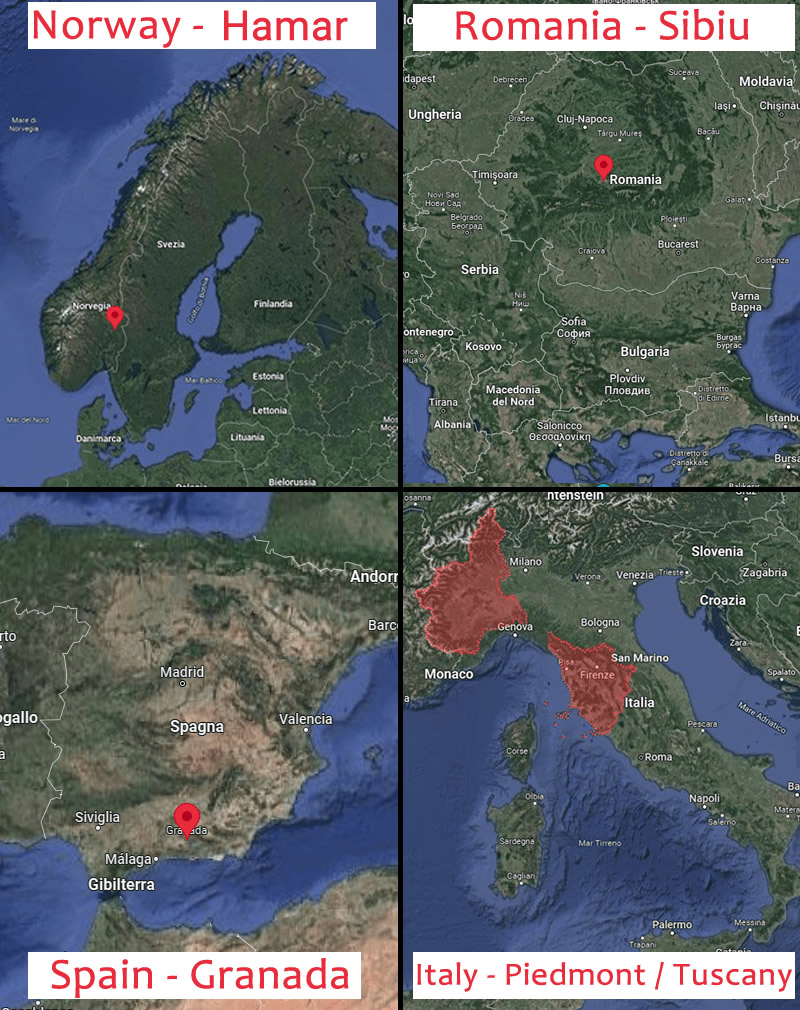
Università degli Studi di Firenze
Davide Capperucci davide.capperucci@unifi.it
Martin Dodman martin.dodman@gmail.com Marianna Piccioli
Matteo Maienza
Irene Scierri
Ilaria Salvadori
David Martinez Mairelez
Italy, FLORENCE
Universidad de Granada
Raúl Ruiz Cecilia raulruiz@ugr.es
Juan Ramón Guijarro Ojeda
Leopoldo Medina Sánchez
Manuel Jesús Cardoso Pulido
Antonio Garcés Rodríguez
Javier Villoria Prieto
Cristina Pérez Valverde
Spain, GRANADA (Andalucía)
Høgskolen i innlandet
Thor André Skrefsrud thor.skrefsrud@inn.no
Ylva Langaas
Kristine Nymo Sundby
Susanne Gunvor Jonsson
Robert Didham
Norway, HAMAR
USR Piemonte – Rete Sostenibilità
Tiziana Lain tiziana.lain61@gmail.com Davide Martini
Michela Povero
Ilaria Giavelli
Italy, TORINO
Universitatea Lucian Blaga din Sibiu
Daniel Mara daniel.mara@ulbsibiu.ro
Alina Georegta Mag
Olivia Andrei
Ana-Maria Madina
Teodora Maria Milcu
Romania, SIBIU
Şcoala gimnazială Nr.21
Violeta Hortensia Solomon violetaenus@yahoo.com Nicoleta Codruta Trantor
Sandina Florina Radut
George Pintea
Romania,Centru SIBIU
Schools
The Participating Schools
Italy
USR Piemonte – Rete Sostenibilità
IC Tommaseo (TO) (ISCED 1 and 2), IC Nichelino IV (TO) (ISCED 1 and 2), IC Carducci di Busca (CN) (ISCED 1 and 2), IC Pavone Canavese (TO) (ISCED 1 and 2), IC Forno Canavese (TO) (ISCED 1 and 2), IC Robilante (CN) (ISCED 1) and IC Morozzo (CN) (ISCED 1 and 2)
Spain
University of Granada
Nova Comprehensive School Medina Elvira (ISCED 1, 2), CEIP San Isidoro, Deifontes (ISCED 1, 2), CEIP Miguel de Cervantes, Armilla (ISCED 1, 2)
Norway
Innland University of Norway
Rollsløkken Primary School (ISCED 1), Fagerlund Primary School (ISCED 1), Børstad Lower Secondary School (ISCED 2)
Romania
University of Sibiu and Scoala Gimnaziala Nr. 21
Scoala Gimnaziala 25 Sibiu (ISCED 1, 2), Scoala Gimnaziala Sura Mica, Sibiu (ISCED 1, 2), Colegiul National “Octavian Goga” Sibiu (ISCED 1, 2)
Contact Us


